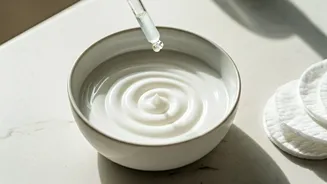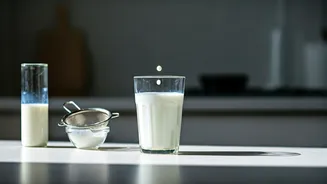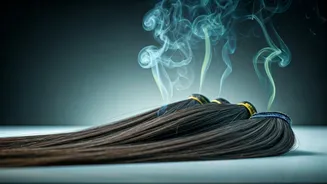Oiling for Hair Growth
Hair oiling is a tried-and-true method for fostering healthy hair, often passed down through generations. The practice includes applying oils directly
to the scalp and hair to provide nourishment, hydration, and stimulation, which are the fundamental building blocks for growth. Oils contribute by acting as a protective barrier, preventing moisture loss and damage from environmental factors. When you massage the oil into the scalp, you also stimulate blood circulation, which encourages hair follicles to thrive. Different oils offer varied benefits such as promoting shine, reducing frizz, and strengthening the hair shaft. This section is set to discuss a curated list of the best oils, each with unique properties and advantages that will assist in hair growth. Consistency is key with hair oiling. Making it a regular part of your hair care routine can yield noticeable improvements in the look, feel, and growth rate of your hair over time.
Coconut Oil's Wonders
Coconut oil, a staple in many hair care routines, is renowned for its ability to penetrate the hair shaft deeply. This deep penetration results in reduced protein loss, which helps strengthen the hair, thus decreasing breakage. Its rich composition offers essential fatty acids and vitamins that moisturize and nourish the scalp, which in turn, promotes a healthy environment for hair growth. Applying coconut oil before washing can protect the hair from the harsh effects of shampooing. Regular use of coconut oil helps the hair stay hydrated, less prone to damage, and noticeably softer. To maximize the benefits, warm coconut oil before applying it, allowing for better absorption. Use it for overnight treatments or shorter periods, depending on your hair's needs. The gentle, yet effective nature of coconut oil makes it suitable for most hair types, solidifying its place as a trusted ally in the quest for flourishing hair.
Argan Oil's Benefits
Argan oil, often termed 'liquid gold', is packed with vitamin E and antioxidants that safeguard hair from damage. The oil is celebrated for its ability to tame frizz and add a glossy sheen. It deeply conditions the hair, contributing to its manageability and decreasing breakage. When used regularly, argan oil supports the hair's natural elasticity, rendering it more resistant to styling and environmental stress. This oil is especially beneficial for those with dry or damaged hair, because of its intensely moisturizing properties. Applying a few drops to damp hair after washing helps detangle and prevent damage from heat styling tools. Argan oil's lightweight texture means it does not weigh the hair down, which makes it suitable for various hair types. Regularly including argan oil in your routine can lead to healthier, more resilient, and visibly radiant hair, enhancing its natural vitality.
Castor Oil's Role
Castor oil, a thick and viscous oil, is frequently utilized to stimulate hair growth and improve hair density. It is abundant in ricinoleic acid, an omega-9 fatty acid, which can boost blood circulation to the scalp, which can accelerate hair growth. Known for its potential to strengthen hair and reduce breakage, castor oil can also moisturize the scalp and hair. Often used to address hair loss and thinning, regular application of castor oil may result in noticeably thicker, fuller hair. Because of its heavy nature, dilute it with a carrier oil, such as coconut or jojoba oil, to make it more manageable. Apply the mixture to the scalp and hair, and let it sit for several hours or overnight for best outcomes. While effective, castor oil must be used carefully due to its thickness. Consistent usage, though, can offer amazing results by nourishing the hair follicles and promoting overall hair health.
Amla Oil's Advantages
Amla oil, derived from the Indian gooseberry, is a popular choice in promoting hair health, because it is packed with antioxidants and vitamins. This oil is known to strengthen hair follicles, which reduces hair fall and stimulates growth. It conditions the hair, adding shine and improving texture, while simultaneously aiding in reducing premature graying. The rich concentration of vitamin C in amla oil contributes to its ability to protect hair from damage. Regular use of amla oil can fortify hair strands from the roots, leaving them thicker and healthier. Use it as a pre-shampoo treatment by gently massaging it into the scalp and hair. Letting it sit for a while can optimize its nourishing effects. Amla oil is particularly beneficial for those aiming to improve hair thickness and vibrancy and its use reflects a holistic approach to hair care.
Bhringraj Oil's Power
Bhringraj oil, a product derived from a plant that is sometimes referred to as 'the king of hair', is highly valued in Ayurvedic traditions for its hair-enhancing properties. It is believed to invigorate hair follicles, which encourages hair growth and enhances the volume of hair. Bhringraj oil is often used to combat hair loss and early graying. It has the ability to soothe the scalp and reduce issues like dandruff, thereby providing a healthy environment for the hair to flourish. Massaging bhringraj oil into the scalp can increase blood circulation, fostering better nutrient delivery to the hair follicles. Its regular use can result in stronger, thicker, and more vibrant hair. Using bhringraj oil can lead to a significant improvement in the hair's general health and appearance over time, highlighting its vital role in promoting a healthy scalp and hair.
Jojoba Oil's Qualities
Jojoba oil, resembling the natural oils produced by the scalp, excels at moisturizing the hair without making it greasy. This similarity allows jojoba oil to easily penetrate the hair shaft, promoting hydration from within. It is an excellent emollient, softening and smoothing the hair, which decreases breakage and tangling. Jojoba oil is packed with vitamins and minerals that boost hair health, and its non-greasy formula renders it great for all hair types. Regular use of jojoba oil helps balance the scalp's oil production, preventing issues like dandruff and an oily scalp. Applying a few drops to the hair after showering helps in styling and adds a layer of protection against external factors. This versatile oil keeps the hair nourished, shiny, and well-balanced, adding to its popularity among hair care enthusiasts.
Rosemary Oil's Impact
Rosemary oil, known for its ability to stimulate hair growth, is a notable essential oil frequently included in hair care routines. It is believed to improve circulation to the scalp, which encourages the hair follicles and boosts hair growth. Rosemary oil may also help prevent hair loss and promote hair thickness. Studies suggest that it can be as effective as some conventional treatments for hair loss. To prevent irritation, rosemary oil should always be diluted with a carrier oil like coconut or jojoba oil. Massage the diluted oil into the scalp and let it sit for a while before washing it off. Consistent use of rosemary oil can boost hair health and improve the overall condition of the hair and scalp, making it a great addition to your hair care routine. Its encouraging effects make it a great choice for those aiming to boost their hair growth naturally.
Almond Oil's Benefits
Almond oil, a light, versatile oil, is rich in vitamin E, fatty acids, and antioxidants, which play a crucial role in hair health. It effectively moisturizes and softens the hair, resulting in less breakage and a more manageable appearance. Almond oil strengthens hair strands from root to tip, enhancing their resistance to damage. This oil provides a protective barrier against environmental aggressors and adds a noticeable shine. It can also help to soothe the scalp, reducing dryness and irritation. Because of its lightweight nature, it works well for all hair types, from fine to thick. Applying almond oil to the hair regularly provides nourishment, making it shinier, stronger, and less prone to damage. Its widespread availability and pleasant aroma make it a user-friendly and practical option for anyone looking to improve their hair's health and appearance.














